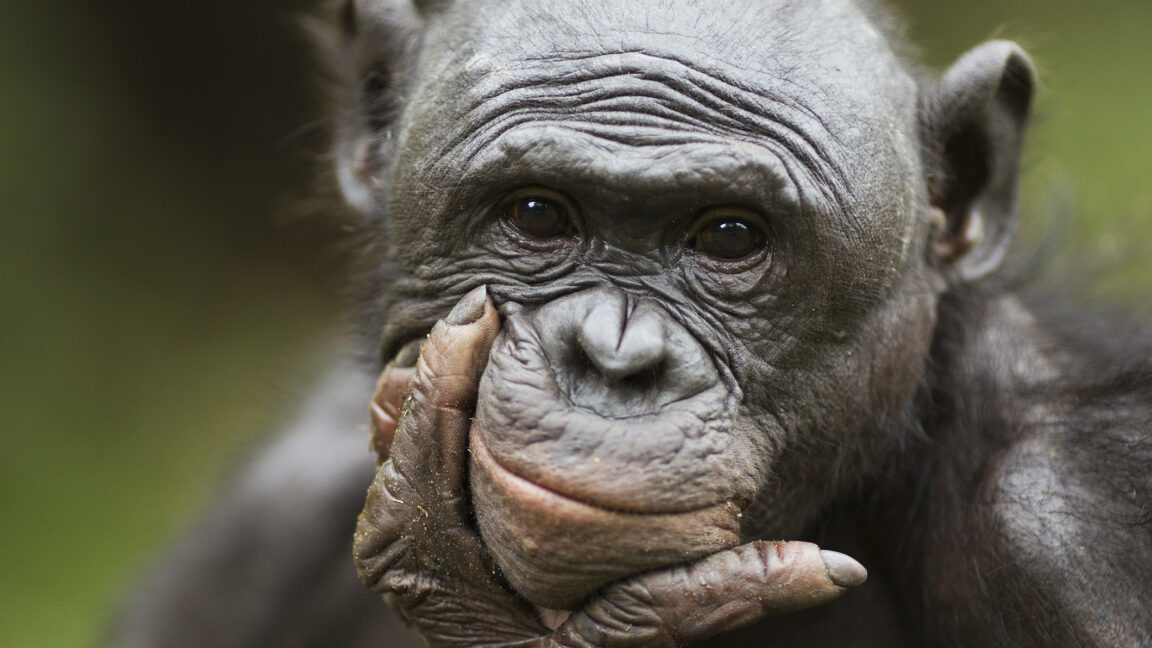
Bonobos recognize when humans are ignorant, try to help
arstechnica.com
Cluing you in Bonobos recognize when humans are ignorant, try to help Study provides evidence that our relatives have a "theory of mind." John Timmer Feb 3, 2025 5:28 pm | 20 Credit: Anup Shah Credit: Anup Shah Story textSizeSmallStandardLargeWidth *StandardWideLinksStandardOrange* Subscribers only Learn moreA lot of human society requires what's called a "theory of mind"the ability to infer the mental state of another person and adjust our actions based on what we expect they know and are thinking. We don't always get this rightit's easy to get confused about what someone else might be thinkingbut we still rely on it to navigate through everything from complicated social situations to avoid bumping into people on the street.There's some mixed evidence that other animals have a limited theory of mind, but there are alternate interpretations for most of it. So two researchers at Johns Hopkins, Luke Townrow and Christopher Krupenye, came up with a way of testing whether some of our closest living relatives, the bonobos, could infer the state of mind of a human they were cooperating with. The work clearly showed that the bonobos could tell when their human partner was ignorant.Now you see it...The experimental approach is quite simple, and involves a setup familiar to street hustlers: a set of three cups, with a treat placed under one of them. Except in this case, there's no sleight-of-hand in that the chimp can watch as one experimenter places the treat under a cup, and all of the cups remain stationary throughout the experiment.To get the treat, however, requires the cooperation of a second human experimenter. That person has to identify the right cup, then give the treat under it to the bonobo. In some experiments, this human can watch the treat being hidden through a transparent partition, and so knows exactly where it is. In others, however, the partition is solid, leaving the human with no idea of which cup might be hiding the food.This setup means that the bonobo will always know where the food is and will also know whether the human could potentially have the same knowledge.The bonobos were first familiarized with the setup and got to experience their human partner taking the treat out from under the cup and giving it to them. Once they were familiar with the process, they watched the food being hidden without any partner present, which demonstrated they rarely took any food-directed actions without a good reason to do so. In contrast, when their human partner was present, they were about eight times more likely to point to the cup with the food under it.The key question, then, was whether the bonobos acted any differently when the experiment was set up behind the solid partition compared to when their human partner could see where the food was hidden.The answer was yes. When the partition was solid, bonobos were quicker to start pointing to where the food was hidden, and they pointed more often during the 10 seconds between when the partition was removed and the researcher checked the cups for the food. One of the three bonobos tested was impatient and pointed a lot regardless of whether their partner knew which cup held the food, but even then pointed a bit more often when the solid partition was used.I know what youre thinkingAll of that indicates that the bonobos can make inferences about the state of knowledge of a human partner and will adjust their behavior accordingly. So, at least on some level, the animals have a theory of mind that helps them accomplish things.That said, the experiment created a pretty contrived situation. The bonobos were cooperating with a human, something that never occurs in the wild (the animals are pretty unlikely to ever come across food hidden under plastic cups, for that matter). There are some indications in wild populations that bonobos will adjust the warnings they give to their peers if said peers are unaware of the threat. That's not a knock on this work, which was designed to test for similar behavior in a controlled manner, but just a reminder that we need to be cautious about generalizing these conclusions until we have evidence that doing so is warranted.The bonobo named Teco, who tended to point at the food a lot in all circumstances, also reminded us of another caution: animals are individuals, and they may have some quirks. With only three bonobos tested, we really don't have a strong sense of the full spectrum of behavior we might see in a large group of these species.Still, the work indicates that some of our close relatives have some aspects of a theory of mind, and there are contexts where they'll put it to use for their benefit.PNAS, 2025. DOI: 10.1073/pnas.2412450122 (About DOIs).John TimmerSenior Science EditorJohn TimmerSenior Science Editor John is Ars Technica's science editor. He has a Bachelor of Arts in Biochemistry from Columbia University, and a Ph.D. in Molecular and Cell Biology from the University of California, Berkeley. When physically separated from his keyboard, he tends to seek out a bicycle, or a scenic location for communing with his hiking boots. 20 Comments
0 Commenti
·0 condivisioni
·65 Views


